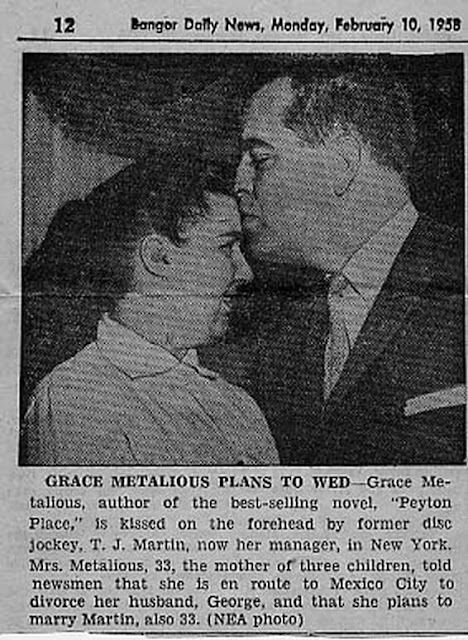 |
| George Metalious |
Her life began under difficult conditions, and ironically, read a bit like her own novel. Grace Metalious was born Marie Grace de Repentigny on September 8, 1924, in Manchester, New Hampshire. Her family was of French Canadian descent. She was raised in a very poor and broken home in Manchester, New Hampshire. At age 11, her father "walked out" on the family leaving behind Grace with her mother and 2 sisters. Grace's own mother attempted to hide their heritage and moved her family into neighborhoods with less Franco-American populations. Her mother believed that by doing so, her children may be provided with better opportunities.
"Anxious for Grace to better herself, her mother insisted upon their living in neighborhoods in which there weren't many French Canadians, one of the last groups to emigrate to Manchester and thus, located far down on the social totem pole. From her mother, Grace learned first-hand about dissembling and hiding secrets, the revelation of which would lie at the heart of her first and most famous novel, "Peyton Place." ...The Catholic Church frowned on divorce and ...made it very difficult for a person who was a Catholic to obtain one and remain a member of the faith in good standing. This meant that it was very unusual for a married French Canadian couple to legally dissolve their marriage in the first half of the last century. Grace and her sisters felt shame, shame for coming from a broken home and shame from the resulting social stigmatization, a psychological state underscored and deepened by the social, economic and political inferiority of the French Canadians by the Yankees ." - Source: imbd
 |
| George and Grace Metalious |
As time marched on, they had 2 more children while living in extreme poverty. It was during all of this, that Grace became a serious writer. Apparently, she had a great disregard for housework, and for being a housewife in general, much to George's chagrin. In one article I read, while researching for this post, it (with no running water) was a "pig sty". Apparently, Grace could only be bothered to clean the space in a corner where she had kept her typewriter to write. George had wanted an ordinary home with an ordinary housewife, but Grace would have nothing of it.
 |
| Grace Metalious |
It is said that Grace was inspired by a real-life murder that had sensationalized the town where she now lived, in Gilmanton [Ironworks], New Hampshire about a decade before she began writing the book, were a young girl had shot her father because he had been molesting her. To hide the murder, she hid his corpse in a barn. Grace began working on the first draft, and at the end of 10 weeks, in 1955, she completed a book entitled, The Tree and the Blossom, but upon looking at a map, she and George changed the title to it's legendary, fictional name. The novel's name and fictional location was forever after known as "Peyton Place".
Her writing style is considered brilliant - how she worked the dialogue, descriptions, and how she used narrative lines - to connect the different families and their stories. In the novel, she wrote about abortion, rape, domestic violence, homosexuality, unwed mothers, suicide, incest and murder. These topics were not found in the mainstream novels being published of the day, with the possible exception of Lolita.
Every major publishing company rejected the book, and it was a female publisher at Julian Messner and Company, by the name of Katheryn G. Messner, who saw an opportunity and gave the green light to print it. Upon publication it was the 2nd largest selling book - second only to Gone With The Wind. Those who bought the book, hid the cover in public, or read it in secret, but they read it....
From here on, George and Grace's relationship was tumultuous, and had more scandals of their own. After the publication of Peyton Place, both George and Grace had affairs, and they separated several times. George became a principle at the High School in Gilmanton, New Hampshire. Also during this time, each had extramarital affairs. It was documented that George crept into his old house to photograph her in bed with a lover.
She bought a fancy home and then became involved with her manager, Thomas J. Martin, (known as T.J.) before she was divorced. Her divorce from George was finalized on February 25, 1958. Just 3 days later on February 28th, (another source indicates it was March 1st) she married T.J. and this marriage only lasted about 20 months. T.J. was a disc jockey in Laconia at that time.
She would leave him to go out on drinking binges for weeks at a time, and their relationship was unstable. This ultimately lead to divorce on Oct 6, 1960. During these times the children were shuffled between the George and Grace.
Eventually, she went back to George, in 1960 when he was living on Martha's Vinyard and they remarried on Oct 12, 1961. George was there to take care of her, as she was deeply in the throws of alcoholism.
Grace made this caustic comment regarding the township in which she lived: "these towns look as peaceful as a postcard picture … beneath that picture it’s like turning over a rock with your foot — all kinds of strange things crawl out … everybody known what’s going on … but they don’t want outsiders to know..."
As I mentioned, her wildly popular book went on to become a movie, and later a television series. Both are said to have softened the edges of the actual novel.
Grace was known for wearing men's clothing and her marketing publicists dubbed her "Pandora in Blue Jeans". In most of the photographs that we see of her, she is wearing denim pants. When she showed up in New York City, wearing her a dreary style of garb, her publicists were rather taken aback. I guess you could say she was a no nonsense kind of girl, and stuck to her own principles and ideals.

Grace felt the pressure of her life weighing her down around her like a noose made of lead. It is believed she committed a slow suicide by drinking. Those close to her, grew frightened of her and especially afraid to mention her drinking problem. She became reckless leaving her children with others, while she continued to drink and essentially forgot them, so those left responsible would have to drive them home. She missed major appearances and one can only imagine that she was in a bitter world of her own. George had truly tried, but the bottom line was that he had finally had enough and left Grace, for good.
To add insult to injury, Grace Metalious never became rich from writing Peyton Place, as she did not maintain money from any of her publications. In fact, her agent plundered most of her income and at the time of her death, she was penniless and in debt.
Grace had also been generous, after Peyton Place hit the book stands. Fair-weather friends and family crawled out of the woodwork to ask her for money. Never hesitating, she freely wrote checks out to anyone indicating that they were in need.
At the end of her short life; and, with her husband and money gone, Grace was associated with a British journalist working for the Boston Mirror. His name was John Rees. At the time, Rees apparently had a wife of 15 years, along with 5 children but had reported to others that he was single. His disgraceful behavior deeply embarrassed his wife, Anthea, who only had knowledge of his friendship with Grace in a professional capacity. Apparently, he had told his wife that he was in the states to obtain a job with the newspapers. Rees had been present at the hospital at the time of Grace's death, when the doctor quietly told him that she had died at 10:30 a.m.
Grace had died from cirrhosis of the liver at Beth Israel Hospital in Boston on Tuesday, February 25, 1964. She was only 39 years old.
Just hours before her death, Grace had changed her will to leave everything to Rees; but, thankfully, the Metalious family was eventually able to reverse this. Little did it matter in the end, (as previously mentioned) she died heavily in debt. She had received no royalties for her movies or the television series.
One of her final wishes was that the family not hold a funeral for her, as she wanted her body to be donated to science, but Harvard refused it in the midst of prevailing lawsuits. The most prominent legal matter in which the New Hampshire court ruled that her funeral would be held, is known as Holland vs. Metalious, which set a legal precedent that the rights of the body of the deceased belong to the family. (Attorney, John Holland was the Executor of the Estate). The family held a funeral, where the children witnessed their father weeping as they knelt near the casket.
Her body was placed in a vault in the Smith Meeting House Cemetery in Gilmanton, and her burial had to wait until the following Spring when she could be buried, as the ground was frozen at the time of her death. It is said that the family had received several phone calls stating that they did not want "that bitch" buried in their town.
One thing that is apparent, is that Grace's presence both while living and posthumously, left an indelible mark in the town of Gilmanton and around the world - whether for good or ill - she opened the door to feminism and boldly went were no woman had gone before.
Story and research by Denise Goodwin, All Rights Reserved.
November 20, 2015
All photo credits: Google Images / Pinterest




















It is painful how terrified she looks in most of these pictures. I hope she has finally found the peace she didn't have in life.
ReplyDelete